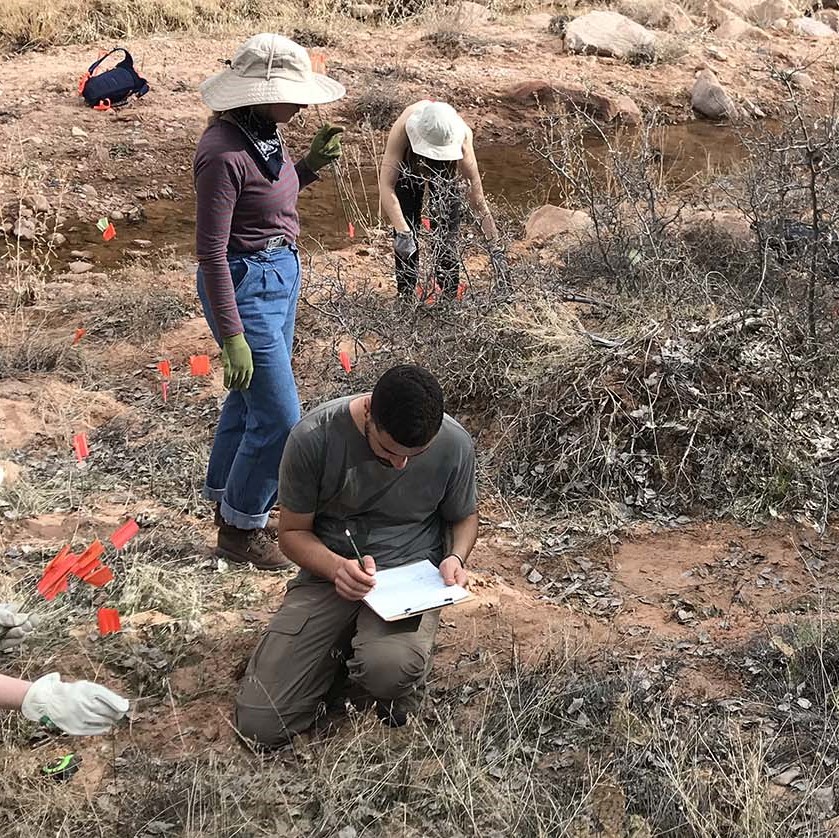Anthropology Master's Program
***If there is a financial need, the Anthropology Department at the University of Utah can assist with covering the cost of Graduate Applications that are submitted before the deadline.
Please email Serena Madsen for the Graduate Application waiver code.
The Anthropology department offers an M.A. degree and M.S. degree in four tracks: Biological Anthropology; Archaeology; Evolution of Culture, Cognition, and Behavior; and Evolutionary Ecology. Incoming students are expected to concentrate their graduate work in one of these areas and are encouraged to become involved in research early in their training.
Both the M.A. and M.S. programs are designed to be completed in two years. The degree is awarded upon successful completion of required coursework and a passing grade on the master's qualifying examination.
MASTERS PROGRAM CONTACTS

Adrian Bell
Adrian.Bell@anthro.utah.edu

Serena Madsen
Students work closely with faculty members to pursue specialized training in one or more of the following program areas:
Regardless of which emphasis area you choose, every Masters student must complete the following program requirements:
Specific course requirements vary by program, but all incoming students are expected to take the proseminar series in their first year, which introduces students to the history of ideas in the four areas.
Proseminar Series(Anthropology 6100, 6200, 6300, 6400), are to be taken in the first year (students who have previously taken ANTH 6161 are exempt).
StatisticsAll graduate students are expected to have basic proficiency in statistics. Most graduate students (particularly those in Biological Anthropology, evolutionary ecology and Archaeology) will be expected to gain additional statistical expertise, as determined by the student’s supervisory committee.
ElectivesElectives are selected by the student in consultation with his/her supervisory committee and may include courses from other departments. Individual curricula may vary depending on the student’s interests and professional agenda. Students seeking an M.A. degree must also demonstrate standard proficiency in one foreign language as approved by the supervisory committee. Electives may (but are not required to) include ANTH 6950 (Individual Study) for 1-3 credit hours. ANTH 6611–Preparation of Grant Proposals in Anthropology/3 credit hours is recommended for all students, but not required.
Emphasis Specific requirements
In addition to the department-wide required courses, masters’ students are required to take one of the following sets of courses. Courses in addition to these may be required by a student’s supervisory committee.
Archaeology
The following courses are required for all Archaeology Master’s students:
ANTH 6361 – Behavioral Ecology and Archaeology/3 credit hours
ANTH 6345 – Cultural Resources Management/3 credit hours
Electives – 5 to 9 courses (15-27 credit hours)
Biological Anthropology
Determined by the student’s supervisory committee.
Evolution of Culture, Cognition and Behavior
The following course is required for all Evolution of Culture, Cognition and BehaviorMaster’s students:
ANTH 5169 – Ethnographic Methods/3 credit hours
Evolutionary Ecology
The following courses are required for all Evolutionary Ecology Master’s students:
The Graduate School has requirements concerning hours of coursework, GPA, continuous registration, and language proficiency. These requirements include the following: (a) minimum of 30 credit hours in graduate courses (5000 or above), (b) 3.0 or higher GPA, and (c) continuous registration (3 credit hours minimum) fall and spring until graduation. Please consult the Graduate Catalog for a complete description of these requirements.
There is a University (not departmental) language requirement for the MA (not MS) degree. The student's committee must approve the choice of language, and standard proficiency must be certified by the Department of Languages and Literature. There is no language requirement for the MS degree.
A critical aspect of timely completion of your graduate degree is selecting a Supervisory Committee Chair and forming a committee as soon as possible. All University of Utah faculty members including regular (tenured or tenure track) research, clinical, emeritus, visiting, auxiliary, and adjunct are eligible to serve as supervisory committee members.
The supervisory committee is usually formed in the first year of graduate work. It is the responsibility of the student to approach prospective committee members with respect to their willingness and availability to serve in such a capacity. Faculty members have the right, however, for justifiable academic reasons, to refuse to serve on a student's supervisory committee.
Master's supervisory committees consist of three faculty members, the majority of whom must be regular (tenured or tenure track) faculty in the student's major department.
Master’s Qualifying Exercise
All students are required to complete a qualifying exercise by the end of their fourth FTE (full-time effort) semester in this department. Such exercises may include either: a) a written exam (6-8 essays written in two four-hour sessions), or b) a non thesis project. Students are also required to pass an oral examination focusing on the written exam or project, which should take place within 10 days of completion of the written portion of the exercise.
Written Exam: 6-8 essays written in two four-hour sessions. The supervisory committee administers the examination, and the choice of questions is determined by the student's chair, in consultation with other members of the committee. During preparation, however, students should feel free to approach any faculty member— all faculty are willing to help all students equally. As with any examination essay, a good essay on the Master’s exam will make an argument and support it with evidence. It will show familiarity with the literature as well as the ability to synthesize it and evaluate conflicting points of view.
Non-thesis project: Students should identify and agree on a non-thesis project with their Chair
and on the advice of their Supervisory Committee. Students are encouraged to choose,
and
produce, a project that will likely result in a publishable paper. A written draft
of the project
should be circulated to the Supervisory Committee no later than March 15 (or by the
end of the
8th week of the graduating semester).
Oral Examination: The oral exam is conducted by the Supervisory Committee. The committee will usually ask the student to elaborate on areas within the written exam or the non-thesis project they feel deserves further attention, but other topics may be raised as well. Students should be prepared to discuss other questions and issues, including questions that were not chosen for the written essays or directly related to the non-thesis project.
Students should consult the graduate handbook for additional information on what to expect and how to prepare.
Evaluation
The student's Supervisory Committee will evaluate the exam or non-thesis project and discuss the result with the student immediately following the oral exam. Although some students enter the Master’s program with the intention of moving into the Ph.D program, admission into the doctoral program for enrolled Master’s students requires both successful completion of the M.A./M.S. degree and formal approval by the Graduate Committee. Students should not assume that satisfactory performance in a Master’s program ensures invitation or admission into the doctoral program.
The Master’s Qualifying Exercise will be assigned one of three grades: 1) high pass, 2) low pass, or 3) fail. Students earning a "high pass" grade will be awarded the M.A./M.S. degree and be encouraged to proceed into the Ph.D program. A "low pass" grade will satisfy the requirement for the M.A./M.S. but the student will not be permitted to continue into the Ph.D. program. No degree will be awarded for a failing grade.
Upon completion and receipt of a passing grade, the student should provide written
documentation to the Programs Manager of their exam result and date completed including
their chair signature.
GRADUATE HANDBOOK




